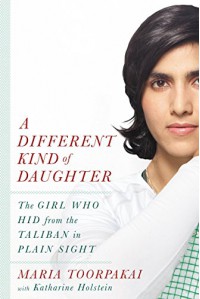Out in May

Disclaimer: ARC via Netgalley.
Every time there is a terrorist attack committed by someone who claims to be follower of Islam someone who claims to be a follower of Christianity wonders why Muslims condemn the terrorist.
Toorpaki’s book (written with the help of Katherine Holstein) should be required reading for such idiots.
Toorpaki is a squash player from Pakistan, from the area of Pakistan where the Taliban has a presence, so needless to say her abilities draw death threats from that group. But that isn’t the most compelling part of this book.
Toorpaki’s parts are a huge part of the book, and the reason why this book should be handed to idiots. Toorpaki’s father, Shams, is a man from a family of rank but he is not a traditional son. While he is a devout Muslim, he is not conservative in matters of religion. He believes in education for all his children, and more importantly, acknowledges his wife as his equal (if not ruler). In an arranged marriage, Shams, as Toorpaki notes, gives his wife the gift of finishing her education and even supporting her in manners that even Western men would balk at, even as he teaches. Toorpaki’s mother isn’t less remarkable, rising to a prominent educational position and facing death by a belief in educating girls. Additionally, both parents raise their children (two girls, three boys) to be contributing members of society, educating not just their girls, but their boys as well. Teaching among the many lessons that all people should be accorded respect and that we should never stop learning (or even teaching).
Toorpaki’s parents are what we should all be as human beings.
It is true that the book is partial hero worship to her parents, and it is hard not to see why. By her own admission, Toorpaki was not a traditional daughter. She was far more physical than her sister and a traditional school environment did not work for her. She wasn’t a problem child, at least not in the Western sense of the term. Her parents allow/encourage/accept her tomboyish personality by giving her boy clothes and a bicycle. She even takes up weight lifting prior to her discovery of squash.
And it is that “boyish” aspect of the story that transcends simply Pakistan and deals with gender issues the world over.
Look at Serena Williams, who has been called too manly and not a real woman simply because she is a physical powerhouse. Or the Olympic swimmers who were judged on their appearance as opposed to their medals. Toorpaki’s chronicle about reactions to her post weight lifting appearance as well as her squash ability deal with issues like these. Today in the liberated West, we want our women athletes to be feminine to look like Swimsuit Issue model beauty instead of the physical powerhouse beauties they are. Even Toorpaki’s harassment by her fellow male students is something that we still see in the West – anyone else see that story about a male fan making his way onto the hotel floor where the US Women’s Soccer Team was staying?
Of course, there is much about the Taliban and its impact upon Toorpaki when she becomes a target. This is even more powerful because Toorpaki drew unwanted attention when as a young girl, she assumed, for lack of a better word, a boy’s identity and name – Genghis Khan. The persecution by the Taliban is sadly just a contamination and speaks more for the need of support of people like Toorpaki’s parents then anything as well as highlighting the determination and bravery of the whole Toorpaki family. Furthermore, the struggle to get Toorpaki to safety also shows the strength of a community and community ties.
It’s true, to be fair, that at times there is a desire to mutter “get on with it” or the structure seems a bit loose, but the story is compelling told. While not chatty, it is far more than readable. This is also because Toorpaki includes her family in the telling.
 12
12








